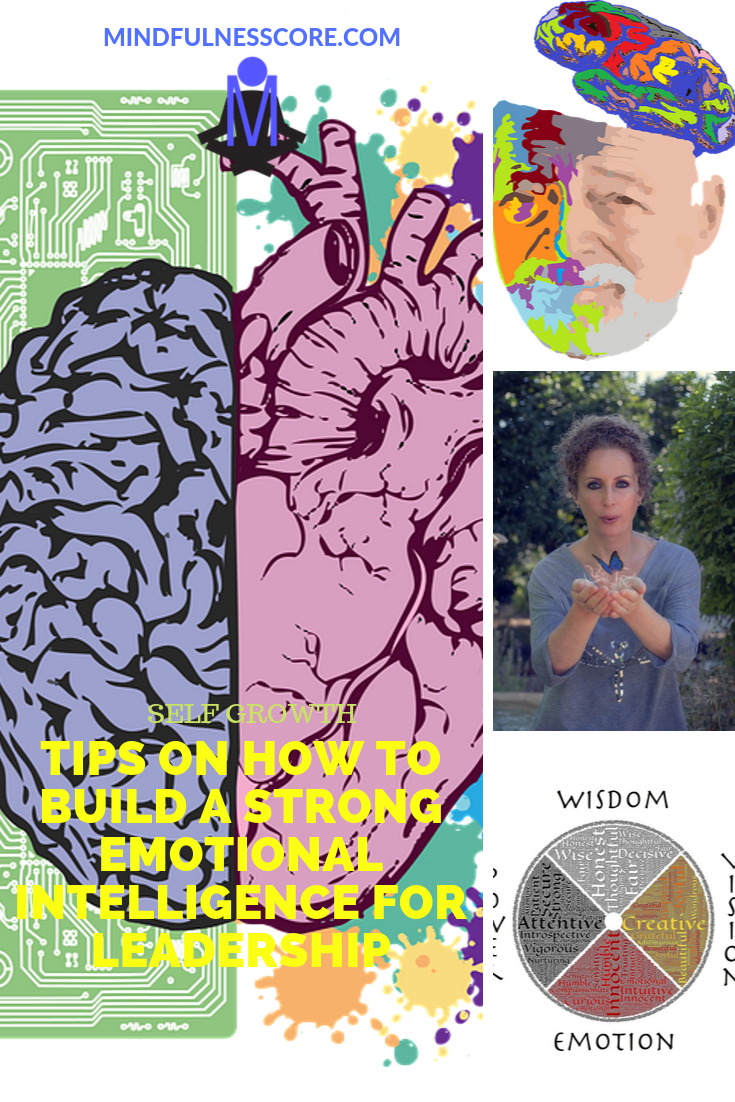Tips on How to Build a Strong Emotional Intelligence for Leadership

Happiness and success are the two primary goals for all of us. While intelligence quotient (IQ) is a significant factor that defines how well you’d be able to achieve these goals, the importance of emotional quotient (EQ) can’t be ignored either. There is no argument over the fact that emotional intelligence is crucial for being successful in various domains of life including relationships, academia, and professional career. Emotional intelligence enables you to make an informed decision, cope with the daily stress and anxiety, be productive and creative, and stay in touch with your feelings. This is what signifies the need for understanding emotional intelligence deeply.
Emotional Intelligence And Leadership
On the surface, leadership skills are easily recognizable regardless of the context. Be it in academia, professional career, social service, or politics, someone who has a vision and is productive and creative enough to realize his vision is considered as a good leader. The ability to take initiative, plan and strategically accomplish the goals are among the other prominent leadership skills. But this is not all that makes up a good leader. A few of the other skills may not be as evident as these but are every bit as crucial in determining the success of a leader as the aforementioned qualities. For instance, the ability to be a part of the team, to put the team on the path to success, to bring the entire team under the same umbrella, and to work with them for the greater good; these are undoubtedly the defining qualities of a successful leader as well.
If you are anything like the majority of us today, you must have always focused on honing the former mentioned skills and qualities which are largely dependent on your IQ. But the latter ones have their development embedded in the roots of emotional intelligence which accentuates its importance if you are looking forward to developing the leadership skills and optimize your personal and professional growth.
What Is Emotional Intelligence?
Emotional Intelligence is defined as the ability of a person to perceive not only his own but the emotions of others as well. The appropriate management of such emotions and understanding the underlying queues about what the emotions signify is termed as emotional intelligence. In terms of a leader, wouldn’t you call one a good manager if you were comfortable with taking your queries and concerns to him, someone who would support your personal and professional growth and be receptive of your needs and willing to work with you to ensure that they are satisfactorily met, someone who had the maturity to be respectful towards your opinions and ideas even in an event of a conflict? These are all the qualities of a leader which summon his emotional intelligence and not the IQ.
The importance of emotional intelligence for a leader has been fairly highlighted above. If you are worried about your current emotional quotient and the hindrance that it may cause in making you a successful leader, the good news for you is that you can always work to improve your emotional intelligence. In order to make it easier for you, we have compiled a list of fundamental strategies that you can employ to improve your emotional intelligence for leadership.
- Your Negative Emotions Are The First Barricade
Being a human, it is a natural tendency for all of us to have certain negative emotions from time to time. While they are mostly associated with an event, it is not unheard of to be in a bad mood for no apparent reason. The first step to improving your emotional intelligence, therefore, is to overcome your negative emotions. Instead of being overwhelmed on every other thing and take it all out on your employees, you are required to make yourself capable of keeping a check and managing your negative emotions. We are not going to lie to you, it is not going to be as easy as it sounds. But with practice and by taking one thing at a time, it can certainly be improved over time.
Under such circumstances, it may work for you to sit back, relax, and try to maintain an objective view of the things. If you are being triggered by someone or something, try to stop yourself from jumping to conclusions. If it’s a person, make an effort into understanding where they are coming from. Meditation and mindfulness practices even the basic ones such as the deep breathing exercise can help a great deal in clearing your vision and making you more calm and peaceful. Sparing 5 minutes after every couple of hours to practice meditation in an attempt to clear up your head may produce life-changing results for you if you are looking forward to keeping your negative emotions under control at work.
- You Need To Focus On Improvement Rather Than Deficiencies
It should go without saying that a good leader with strong emotional intelligence is a fine communicator. People with higher emotional intelligence are known to communicate in a fashion that gently taps on the deficiencies and use specific words which bring the entire attention to the solution that is likely to address them. [restrict] No matter if you are the employee of the year, making mistakes or having a meeting with your boss that didn’t quite go as per your expectations is not a novel concept for any of us. Emotions like sadness, despair, rage, embarrassment, guilt, etc. usually present themselves as your best friend and offer a shoulder to cry on under such circumstances. However, in order to improve your emotional intelligence and become an impeccable leader, you need to change your perspective.
The first thing that you need to ask yourself is “Are these emotions helping me out in any way?”. For any reasonable person, the answer will always return as a “NO”. Now that you know they are not helping, the next thing is to find an alternative. The best that you can do is to make yourself capable of learning from your mistake. Instead of being upset about it for days, ask yourself what is it that you did wrong? What failed you in producing the expected results? Once you have pinpointed what went wrong, the next logical step is to put your focus into finding a solution. What can you do differently the next time for the outcome to be positive? In simpler words, emotionally intelligent people are not whiny about their problems, they are the ones to find a solution.
- Don’t Underestimate The Importance Of Empathy
The concept of management is different for different people. This is what creates a wide range of management styles that are being employed in different organizations, including the one that focuses entirely on production and not on people. For some, it makes a lot of sense since they consider production to the be “ONLY” goal of business. How many times have you a heard a leader or person of authority say, “I am not here to build relationships, I’m here to get the job done”. But what if we told you that this style of leadership has now become obsolete?
It has now been proven with research that a leader who manages to keep a balance between the production, as well as the people, is someone who can produce the best and the most efficient results in the long run. You know what they say, “Someone who feels appreciated will always do more than expected of him”. This is a principle that applies to leadership as well and what demonstrates how imperative empathy can be in professional scenarios.
The next milestone to achieve in an attempt to improve your emotional intelligence and become a fine leader is to adopt empathy. Putting yourself in someone else’s shoes, to feel what he is feeling, to be concerned as he is, is not an easy task and requires a lot of practice. Start with appreciation. Randomly appreciate the work that your employees or colleagues have accomplished. Be available to listen to their problems and concerns and see if there’s something you can do for them. Remember, empathy or appreciation comes from within. Therefore, you may as well start with yourself and spare 5 minutes of your time every morning to sit in a silent corner, close your eyes, focus on your deep, slow breathing while repeating your personal mantra i-e “I’m grateful for …” in your mind.
- Start Expressing Your Emotions And Be Assertive
Emotionally intelligence people are confident about who they are, they are comfortable about expressing their feelings and their stand about certain things, and they are assertive in defining their boundaries. In order to improve your emotional intelligence and become a fine leader, it is required to set your priorities straight and be assertive in practicing your right of disagreement with anyone. It may be harsh to know, but having a sense of guilt after you said “NO” to someone is a sign of weak emotional intelligence.
In the previous tip, you were asked to be empathetic and now you are being told to be assertive. It is understandable for you to be baffled. But the truth is, in order to be emotionally intelligent, you need to be capable of finding the fine line between empathetic and assertive. You have to work on making yourself able to realize the scenarios which require your empathy and the ones where assertiveness is more important. If you start to face difficulty in expressing your emotions, you can always use the XYZ technique. Practicing statements like, “I feel uncomfortable when you expect me to give importance to your tasks over my own priorities”. The words in bold are the X, Y, and Z respectively. Remember, when you start your sentences with the likes of “you should”, “you need to”, “you are”, you essentially trigger the “defensive” in your listener that makes it unlikely for him to be welcoming for your opinions, ideas, or what in general you have to say. Simply put, being emotionally intelligent is all a game of words. The better is your choice of words, the better are you going to be a leader.
Be Proactive And Reactive Against Stress
Last but not least in our list of tips to help you become more emotionally intelligent and a fine leader is to be both proactive as well as reactive against the daily stress and anxiety. This will require you to closely observe your daily routine and see what your common stressors are. To keep your emotional intelligence from taking a hit, you need to be proactive in keeping as many of such stressors at bay as you can.
Stress and anxiety, are nonetheless, a reality of our lives in this time and age. Since it is practically impossible to remove all of it out of your life, you must have a reactive strategy to contain the effects of stress and anxiety as well. Meditation and mindfulness exercises are a surefire way of removing your attention from the stressors and bringing it to the here and now; a positive, harmless event that is happening in the present. It is a tried a tested technique that helps a great deal in making you calm and peaceful, restores your mood, and remove the negative thoughts and emotions. Therefore, it is recommended to practice meditation for a few minutes every day in order to cope with the daily stress effectively and promoting your emotional intelligence.
Conclusion
It is true that some people are born leaders. But are some make themselves to be one with hard work and effort. If you are not one of the formers, we want to help you to become the latter. It is within you to become a flawless leader. And we are here to inform you of the tips that can help you raise your emotional intelligence; a component most necessary for a successful leader. It is time for you to start practicing the tips mentioned above. Take it slow, keep your patience, and be realistic in expecting the results, and you will eventually be able to become a fine leader with higher emotional intelligence. That’s a promise.
[/restrict]


Pingback: Learn Emotional Intelligence Skills in a Workplace – TheBusinessHomeworkHelp